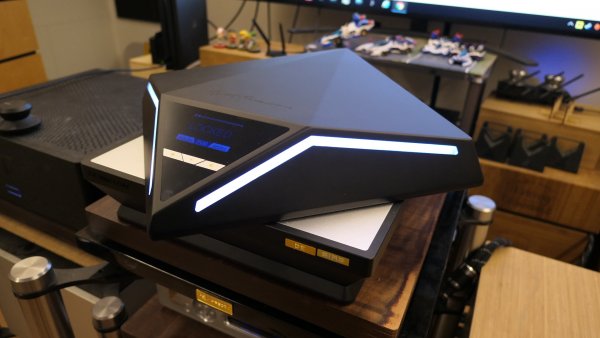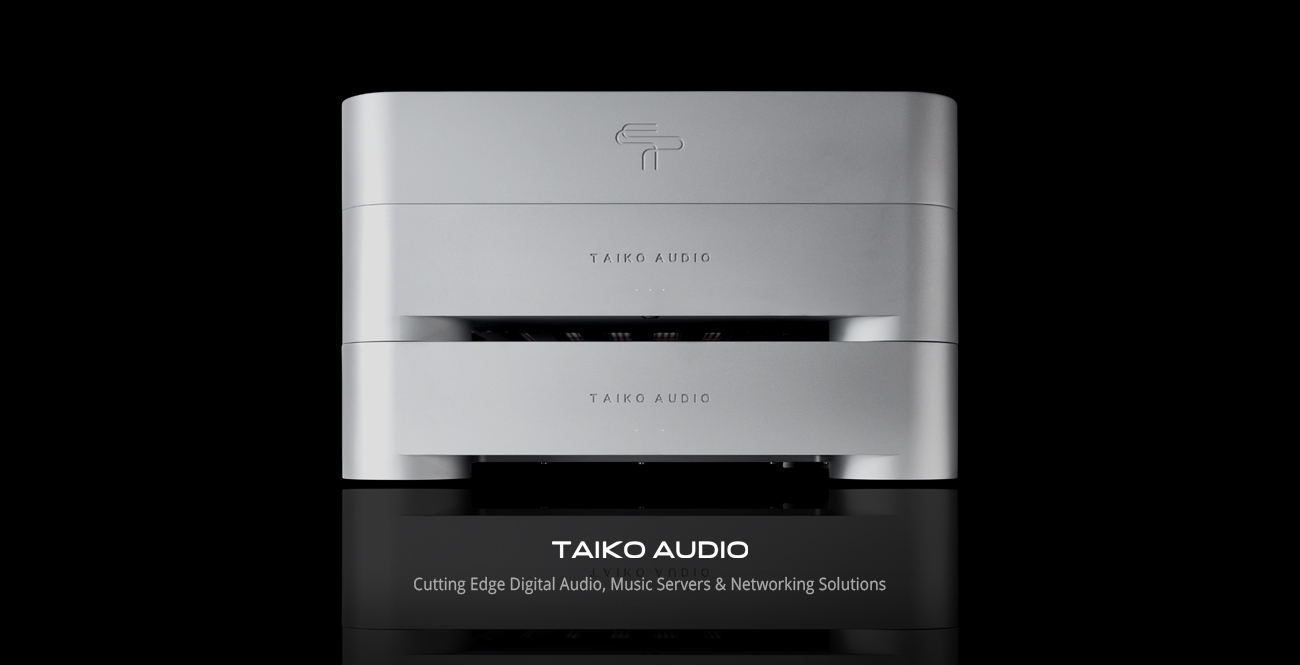I can easily help you with that: simply buy CDs pressed before 1992 (ideally in Germany or UK), rip them accurately and enjoy the REAL music. Not the junk they they are offering at Qubuz, etc. General rule of thumb: avoid remasters like the plague!...there are some bog-standard Redbook, early CDs that are astonishingly good. I've yet to find a general rule of thumb to help me choose the right version, other than listening -- which can be expensive and frustrating. But that's where we are today.
Taiko Audio SGM Extreme : the Crème de la Crème
- Thread starter CKKeung
- Start date
You are using an out of date browser. It may not display this or other websites correctly.
You should upgrade or use an alternative browser.
You should upgrade or use an alternative browser.
I think 16/24bits DACs are fixed points and 32bits DACs are floating points just because of how the bits are stored and calculated. However, I will need to check with Chord for confirmation.Yes, but floating point?
Yes, but floating point?
I believe your answer is going to come in the form of 32 bit floating being 24 bit mantissa + sign. The remainder is exponent. In other words it will be recognized as 24 (technically 25) bit.
A 32 bit integer file actually has more precision, ie DXD.
I believe your answer is going to come in the form of 32 bit floating being 24 bit mantissa + sign. The remainder is exponent. In other words it will be recognized as 24 (technically 25) bit.
A 32 bit integer file actually has more precision, ie DXD.
There is one brand whose flagship DAC is 27 bit, but it can bit-perfect convert up to 32 bit / 768 KHz.
The brand has a lot of anti-fans, but only they can do it.
This is the DAC.

This is only for Korea.
Where can you play this 32-bit floating-point DXD formats?
Not sure how it’s handled on the DAC side of things (after the USB receiver) but afaik you should be able to play that on any Amanero or XMOS DAC which probably covers 95% if not more.
And TRPTK are in Utrecht with a stunning mastering room, well worth a visit.
https://trptk.com/blog/a-new-chapter-32bit-floating-point-dxd/
Nice find, will buy a few and try
Mike they also seem to have DXD 24bit and regular formats for people
"What is your desired download resolution?
- 96/24
- 192/24
- DXD 24bit
- DXD 32bit
- DSD64
- DSD128
- DSD256?
Sounds like one could take advantage of this on existing hardware of any type in the same way as e.g.
Winston may he rest in peace, would remaster at 24/100 for K2 or DXD (non-floating point) and then
produce RBCD media or other formats of superior quality sound due to initial higher resolution mastering.
Last edited:
32 bit floating point has been routinely used by sound engineers in their digital audio workstations, that convert their floating point files to other formats for release. We can accept that for mixing and mastering the increased range can have real advantages. But considering the technical limitations of the DACs, is there any advantage of distributing in float DXD versus DXD?
BTW, can we get also the lower resolution formats if we buy a DXD 32 bit file from TRPTK?
BTW, can we get also the lower resolution formats if we buy a DXD 32 bit file from TRPTK?
While on the subject of mastering quality, an interesting new recording format:
https://www.monoandstereo.com/2020/...ml?utm_source=dlvr.it&utm_medium=facebook&m=1
Another article here:
https://www.thebroadcastbridge.com/...files-promise-a-revolution-in-field-recording
Thanks for sharing,
maybe this can be used for real lossless digital volume controls as well?
Matt
I can easily help you with that: simply buy CDs pressed before 1992 (ideally in Germany or UK), rip them accurately and enjoy the REAL music. Not the junk they they are offering at Qubuz, etc. General rule of thumb: avoid remasters like the plague!
I don't know if I can make a blanket statement like this -- I jumped on the digital bandwagon in 1983 when I was living in Italy and started buying CDs to play on my then new Sony CDP-101. I still have most of those original CDs and while some of them are very nice, some of them are unlistenable, even (especially?) on modern digital equipment. But there are many good examples of CDs mastered and pressed when the only plants available were in Germany and Japan. One recommendation I can make is to hunt down the original Japanese pressed versions of Steely Dan's catalog, if you like the music. They are far and away the best sounding versions I've heard.
Steve
Ayerman said- "Not the junk they they are offering at Qubuz, etc"
I disagree 100%. I listen to Quobuz/Extreme for hours daily and love the sound and the music I am listening to. Not junk imho.
I disagree 100%. I listen to Quobuz/Extreme for hours daily and love the sound and the music I am listening to. Not junk imho.
full disclosure; out of abundance of caution i did reach out to Vince Galbo of MSB and asked him this question directly; he is checking with his engineers.
so i might have spoke too soon.
The 32 bit recordings show 24 on the MSB SII dac
Not sure how it’s handled on the DAC side of things (after the USB receiver) but afaik you should be able to play that on any Amanero or XMOS DAC which probably covers 95% if not more.
Some interesting discussion with Miska on AS, starting with this post:
https://audiophilestyle.com/forums/topic/19715-hq-player/page/725/?tab=comments#comment-1072941
Matt
32 bit floating point has been routinely used by sound engineers in their digital audio workstations, that convert their floating point files to other formats for release. We can accept that for mixing and mastering the increased range can have real advantages. But considering the technical limitations of the DACs, is there any advantage of distributing in float DXD versus DXD?
BTW, can we get also the lower resolution formats if we buy a DXD 32 bit file from TRPTK?
The last time I downloaded from TRPTK, I believe the lower resolution versions where included (not 100% sure). Perhaps interesting, about a hour ago livestream with Brendon Heinst, TRPTK lead recording & mastering engineer:
The last time I downloaded from TRPTK, I believe the lower resolution versions where included (not 100% sure). Perhaps interesting, about a hour ago livestream with Brendon Heinst, TRPTK lead recording & mastering engineer:
Very interesting. We now have 2 competing assertions. Brendon makes a compelling case for the 32-bit floating point samples.
And on the other hand, Jussi asserts (on the AS thread) that "DACs cannot deal with floating point data formats..." and HQPlayer will convert 32-bit floating point input to fixed point (integer). He also claims the "USB Audio Class and S/PDIF support only integer PCM."
Now I'm confused!
But I will say that for the excellent TRPTK recording that I bought — https://trptk.com/catalogue/traveling-light/ — I got both the 32f/352.8 and 24i/352.8 masterings. Notice the f and i to indicate float and integer.
To my ears, the 32f version was quite notably better sounding than the 24i version.
I must have missed it but how did you play it?Very interesting. We now have 2 competing assertions. Brendon makes a compelling case for the 32-bit floating point samples.
And on the other hand, Jussi asserts (on the AS thread) that "DACs cannot deal with floating point data formats..." and HQPlayer will convert 32-bit floating point input to fixed point (integer). He also claims the "USB Audio Class and S/PDIF support only integer PCM."
Now I'm confused!
But I will say that for the excellent TRPTK recording that I bought — https://trptk.com/catalogue/traveling-light/ — I got both the 32f/352.8 and 24i/352.8 masterings. Notice the f and i to indicate float and integer.
To my ears, the 32f version was quite notably better sounding than the 24i version.
I must have missed it but how did you play it?
Roon to Chord ASIO driver.
I must have missed it but how did you play it?
I’ve played 32f recordings on two different Playback Designs DACs without issue and as far as I know my current dCS Vivaldi Upsampler/DAC combo will do the same. I just took a peek at the settings of the JPlay driver I’m using and Max Bits Per Sample (PCM) is set to 32.
Now, I can’t say that some kind of bit-depth conversion isn’t occurring somewhere, but the files do play.
Steve Z
Similar threads
- Replies
- 225
- Views
- 33K
- Replies
- 258
- Views
- 36K
| Steve Williams Site Founder | Site Owner | Administrator | Ron Resnick Site Owner | Administrator | Julian (The Fixer) Website Build | Marketing Managersing |


